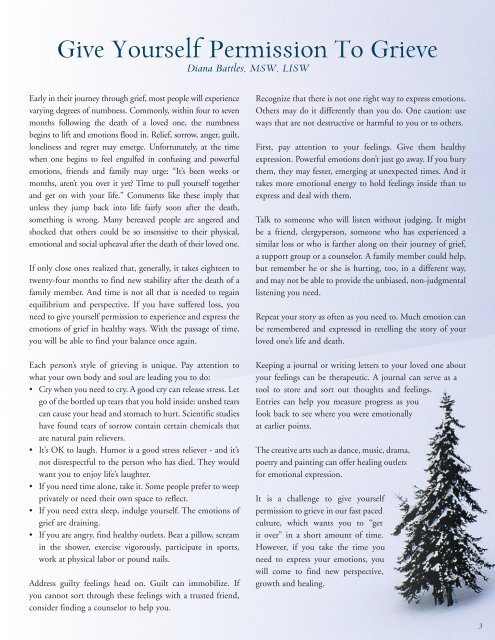Grief and the Holidays - Hospice of the Western Reserve
Grief and the Holidays - Hospice of the Western Reserve
Grief and the Holidays - Hospice of the Western Reserve
Create successful ePaper yourself
Turn your PDF publications into a flip-book with our unique Google optimized e-Paper software.
Give Yourself Permission To Grieve<br />
Diana Battles, MSW, LISW<br />
Early in <strong>the</strong>ir journey through grief, most people will experience<br />
varying degrees <strong>of</strong> numbness. Commonly, within four to seven<br />
months following <strong>the</strong> death <strong>of</strong> a loved one, <strong>the</strong> numbness<br />
begins to lift <strong>and</strong> emotions flood in. Relief, sorrow, anger, guilt,<br />
loneliness <strong>and</strong> regret may emerge. Unfortunately, at <strong>the</strong> time<br />
when one begins to feel engulfed in confusing <strong>and</strong> powerful<br />
emotions, friends <strong>and</strong> family may urge: “It’s been weeks or<br />
months, aren’t you over it yet? Time to pull yourself toge<strong>the</strong>r<br />
<strong>and</strong> get on with your life.” Comments like <strong>the</strong>se imply that<br />
unless <strong>the</strong>y jump back into life fairly soon after <strong>the</strong> death,<br />
something is wrong. Many bereaved people are angered <strong>and</strong><br />
shocked that o<strong>the</strong>rs could be so insensitive to <strong>the</strong>ir physical,<br />
emotional <strong>and</strong> social upheaval after <strong>the</strong> death <strong>of</strong> <strong>the</strong>ir loved one.<br />
If only close ones realized that, generally, it takes eighteen to<br />
twenty-four months to find new stability after <strong>the</strong> death <strong>of</strong> a<br />
family member. And time is not all that is needed to regain<br />
equilibrium <strong>and</strong> perspective. If you have suffered loss, you<br />
need to give yourself permission to experience <strong>and</strong> express <strong>the</strong><br />
emotions <strong>of</strong> grief in healthy ways. With <strong>the</strong> passage <strong>of</strong> time,<br />
you will be able to find your balance once again.<br />
Each person’s style <strong>of</strong> grieving is unique. Pay attention to<br />
what your own body <strong>and</strong> soul are leading you to do:<br />
• Cry when you need to cry. A good cry can release stress. Let<br />
go <strong>of</strong> <strong>the</strong> bottled up tears that you hold inside: unshed tears<br />
can cause your head <strong>and</strong> stomach to hurt. Scientific studies<br />
have found tears <strong>of</strong> sorrow contain certain chemicals that<br />
are natural pain relievers.<br />
• It’s OK to laugh. Humor is a good stress reliever - <strong>and</strong> it’s<br />
not disrespectful to <strong>the</strong> person who has died. They would<br />
want you to enjoy life’s laughter.<br />
• If you need time alone, take it. Some people prefer to weep<br />
privately or need <strong>the</strong>ir own space to reflect.<br />
• If you need extra sleep, indulge yourself. The emotions <strong>of</strong><br />
grief are draining.<br />
• If you are angry, find healthy outlets. Beat a pillow, scream<br />
in <strong>the</strong> shower, exercise vigorously, participate in sports,<br />
work at physical labor or pound nails.<br />
Address guilty feelings head on. Guilt can immobilize. If<br />
you cannot sort through <strong>the</strong>se feelings with a trusted friend,<br />
consider finding a counselor to help you.<br />
Recognize that <strong>the</strong>re is not one right way to express emotions.<br />
O<strong>the</strong>rs may do it differently than you do. One caution: use<br />
ways that are not destructive or harmful to you or to o<strong>the</strong>rs.<br />
First, pay attention to your feelings. Give <strong>the</strong>m healthy<br />
expression. Powerful emotions don’t just go away. If you bury<br />
<strong>the</strong>m, <strong>the</strong>y may fester, emerging at unexpected times. And it<br />
takes more emotional energy to hold feelings inside than to<br />
express <strong>and</strong> deal with <strong>the</strong>m.<br />
Talk to someone who will listen without judging. It might<br />
be a friend, clergyperson, someone who has experienced a<br />
similar loss or who is far<strong>the</strong>r along on <strong>the</strong>ir journey <strong>of</strong> grief,<br />
a support group or a counselor. A family member could help,<br />
but remember he or she is hurting, too, in a different way,<br />
<strong>and</strong> may not be able to provide <strong>the</strong> unbiased, non-judgmental<br />
listening you need.<br />
Repeat your story as <strong>of</strong>ten as you need to. Much emotion can<br />
be remembered <strong>and</strong> expressed in retelling <strong>the</strong> story <strong>of</strong> your<br />
loved one’s life <strong>and</strong> death.<br />
Keeping a journal or writing letters to your loved one about<br />
your feelings can be <strong>the</strong>rapeutic. A journal can serve as a<br />
tool to store <strong>and</strong> sort out thoughts <strong>and</strong> feelings.<br />
Entries can help you measure progress as you<br />
look back to see where you were emotionally<br />
at earlier points.<br />
The creative arts such as dance, music, drama,<br />
poetry <strong>and</strong> painting can <strong>of</strong>fer healing outlets<br />
for emotional expression.<br />
It is a challenge to give yourself<br />
permission to grieve in our fast paced<br />
culture, which wants you to “get<br />
it over” in a short amount <strong>of</strong> time.<br />
However, if you take <strong>the</strong> time you<br />
need to express your emotions, you<br />
will come to find new perspective,<br />
growth <strong>and</strong> healing.<br />
3
















